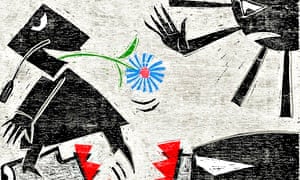
The Theory of “Penti Pentures” (35 punctures) was supposed to explode with a bang. Instead it has evaporated into thin air without a whimper.
There was no secret tape recording of mine informing Nawaz Sharif that I, as caretaker CM Punjab, had applied “Penti Pentures” (ie rigged 35 seats) to the elections in 2013. Indeed, not one word of “Penti Pentures” was even whispered by the great Hafeez Pirzada (with Imran Khan breathing down his neck) when I was cross-examined before the Judicial Commission last week. What was produced was a clip from my TV show of 7th July 2013 in which I had said that about fifteen days before the end of my tenure as caretaker chief minister Punjab on June 6th 2013, (ie, ten days after the election results were announced on May 11) I had become powerless and the Punjab bureaucracy was already looking to the designated new chief minister. So what was so strange about that, the CJP seemed to imply, when he asked Mr Pirzada to move on.
----Also watch
----Also watch
------
Imran Khan’s unending harangue about Nawaz Sharif “rewarding” me for applying “penti pentures” by appointing me chairman of the Pakistan Cricket Board also fell flat. Indeed, it never went to the point of explicating the substance of the so-called “reward”. How could it? I have not drawn a penny in salary for two years. I have not even taken a luxury vehicle for my personal use. In fact, I have abolished all undue “perks and privileges” that previous chairmen enjoyed, like free First Class International Travel with spouse, a posse of hangers-on, a fleet of expensive rented cars, millions of rupees of free tickets for family, friends and cronies during international cricket events abroad, unlimited entertainment allowances, BoG meetings in holiday resorts, and a score-full of jobs in PCB for sifarishis and family.
Imran Khan’s unending harangue about Nawaz Sharif “rewarding” me for applying “penti pentures” by appointing me chairman of the Pakistan Cricket Board also fell flat. Indeed, it never went to the point of explicating the substance of the so-called “reward”. How could it? I have not drawn a penny in salary for two years. I have not even taken a luxury vehicle for my personal use. In fact, I have abolished all undue “perks and privileges” that previous chairmen enjoyed, like free First Class International Travel with spouse, a posse of hangers-on, a fleet of expensive rented cars, millions of rupees of free tickets for family, friends and cronies during international cricket events abroad, unlimited entertainment allowances, BoG meetings in holiday resorts, and a score-full of jobs in PCB for sifarishis and family.
The “Penti Penture Theory” was based on idle talk cunningly fabricated by a maverick named Ejaz Hussain who was desperate to worm his way into the top echelons of Khan’s party. A gullible Imran bought into it readily because it suited his political ploy. How could he manufacture a conspiracy theory of Nawaz Sharif stealing the election without challenging the results of the elections in the Punjab that contributed to Mr Sharif”s thumping victory? Hence it was critical to damn my administration. Fourteen months ago, I sued him in court to prove his allegations or pay damages for defaming me. He hasn’t appeared in court once, nor filed a word in response to my complaint. Much the same may be said of his lackeys like Naeem ul Haque and Shirin Mazari who have parroted the same lie ad nauseum, and “journalists” like Dr Shahid Masood who are constantly creeping out of the woodwork. The amusing fact is that only days after the fiasco in the Supreme Court, Naeem blatantly named the source of the “penti penture” story as Agha Murtaza Poya, the veteran politician and ex-owner of The Muslim newspaper, only to be rebuffed by a stout public denial by Mr Poya hours later.
The fact is that I was the caretaker CM nominee of the PPP and its allies. The fact is that the PMLN had fielded two candidates of its own but only acceded in my favour half an hour before the three-day deadline because it realized its nominees would most certainly be adjudged unsuitable by the ECP. The fact is that Imran Khan publicly welcomed my nomination as a consensus caretaker CM in March. The fact is that I refused to accept the nominee of the ECP, Qamaruzaman Chaudhry, as my Chief Secretary because Imran Khan publicly asked me not to appoint him. The fact is that I shunted 15 senior bureaucrats from the Punjab to Islamabad because they were allegedly close to the Sharifs. The fact is that I shuffled the bureaucracy from Patwari to Chief Secretary and SHO to IGP so that none could complain I was biased. The fact is that I retained two senior secretaries whose close relatives were contesting on PTI tickets. The fact is that my Home Minister was on the PTI’s Task Force on Terrorism. The fact is that I even leaned on the Advocate General appointed by Shahbaz Sharif to resign his constitutional position in order to be neutral. The fact is that the only favour I ever did anyone was to Imran Khan when I allowed him to hold rallies in the centre of the small towns on his campaign trail in Southern Punjab, which was contrary to the SOPs of the elections. The PTI accepted the results as free and fair, a fact corroborated by FAFEN and over 100 international observers.
Imran Khan didn’t have the courage to accuse ex-CJP Iftikhar Chaudhy, ex-Justice Khalil Ramday, and GEO/Jang Group in the JC, all co-accused with me in public. Now that his short-cut-to-power bid has failed and been exposed, he should have the courage to apologise to me and stop tarnishing my reputation.
 ‘
‘